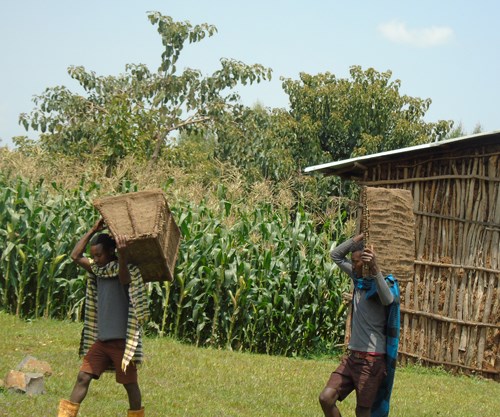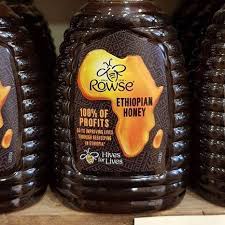Deforestation is a disaster for the environment, but it is a disaster for people too. Bees for Development workers see this in their work helping people around Lake to improve their lives through beekeeping. Here, beekeepers face a huge problem: severe deforestation, including the loss of nectar-bearing trees, has had a devastating impact on bees. The ambitious plan is to help regenerate a hundred acres of forest, providing bee habitat, and to train young landless women and men in beekeeping, giving them a way to earn a living and to secure a better future.
This project is supported by British honey producer Rowse through their Hives for Lives campaign. Her Royal Highness, the Duchess of Cornwall was introduced to a new Rowse product – Ethiopian honey, at the Bee Garden Party in London. Everyone who attended the event was given a bottle of this delicious honey to take home with them. In 2018 Rowse Honey began an exciting partnership with Bees For Development – an international charity, who focus on alleviating poverty worldwide through beekeeping. Their mission is to promote sustainable beekeeping to combat poverty and to build sustainable, resilient livelihoods. They support beekeepers to maintain environments that are good for bees, good for biodiversity and good for people.
Beekeeping can help bring families out of poverty, by providing a sustainable form of income with a low cost of entry. The Rowse and Bees For Development partnership will support two communities in Ethopia by giving people the skills to create their own hives and training in how to keep bees. The initiative aims to create 1000 new bee colonies, 200 new bee keepers and impact the lives of 300 families in Ethiopia. In addition, the programme will also reforest 60 hectares of land, currently devastated by deforestation. The honey bees will play a vital role in sustaining this environment through pollinating crops and plants. Together with Bees For Development we want to offer a pathway out of poverty that is environmentally sustainable and underpins the ecosystem on which thousands of rural families rely for their livelihoods.
Profits from the sale of this honey, sold exclusively at upmarket British supermarket Waitrose are given to the Bees, Trees and People project through Rowse’s Hives for Lives scheme.
They have trained lots of new and practicing beekeepers in various skills; 27 young people learned how to transfer bee colonies, and were provided with 22 bee colonies to be housed in top-bar hives owned by the individuals. Several of the participants are already adding more bees to their apiaries as a result of taking training sessions, and there is every chance of a successful season and a long term future for their beekeeping. Shiferaw Chekle, one of the strongest advocates from the local community explained, “We were trying to arrest this erosion by ourselves. But we have had some difficulties related to lack of skill and material scarcity. The project’s intervention in filling these gaps means a lot to us. We expect we will see good results and we will see our endangered natural resource conserved through this activity. We are committed to this initiative”.


